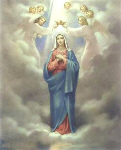
The Glories Of Mary |
IN order that this little work of mine may not be exposed to censure from very fastidious critics, I have thought it best to place in a clearer light some of the proposition which it contains, and which may seem too bold, or perhaps obscure. I here enumerate some of them, and if others, my dear reader, should it come under your eye, I pray you to consider them as meant and spoken by me according to the sense of true and sound theology, and of the holy Roman Catholic Church, whose obedient son I profess myself. In the introduction, referring to chap. 5th of the book, I have said that God has or dained that all graces should come to us through the hands of Mary. Now this is a very consoling truth for souls tenderly attached to the most holy Mary, and for poor sinners who desire to be converted. Nor should this appear to any one inconsistent with sound theology, since its author, St. Augustine, puts it forth as a general statement, that Mary has shared, by means of her charity, in the spiritual birth of all the members of the Church.
A well-known author, whom no one will sus pect of exaggeration or of fanciful and overheated devotion, adds, that as Jesus Christ really formed his Church on Calvary, it is plain that the holy Virgin really co-operated with him, in a peculiar and excellent manner, in its formation. And for the same reason it may be said, that if she brought forth Jesus Christ, the head of the Church, without pain, she did not bring forth the body of this head without pain. Hence sho commenced on Calvary to be, in a particular manner, mother of the whole Church. To say all in a few words, Almighty God, in order to glorify the mother of the Redeemer, has or dained that her great charity should intercede for all those for whom her divine Son offered and paid the superabundant ransom of his precious blood, in which alone is our salvation,, life and resurrection. It is on the basis of this docrine and whatever belongs to it that I have under taken to establish my propositions, which the saints in their affecting colloquies with Mary, and in their fervent discourses concening her, have not hesitated to assert: when an ancient father, quoted by the celebrated Vincenzo Contensone, has written: The fulness of grace was in Christ as the head from which it flows, but in Mary as the neck through which it is transmitted.* This is plainly taught by the angelio Doctor, St. Thomas, who confirms all the foregoing in these words: The blessed Virgin is called full of grace in three ways The third, in reference to its overflowing upon all men. For great is it in each saint if he hath enough of grace for the salvation of many; but this would be the greatest, if he had enough for the salvation of all men; and it is so with Christ and the blessed Virgin, for in every danger we may obtain salvation through the glorious Virgin. Hence, cant. 4, v. 4 a thousand bucklers that is, remedies against dangers hang upon her "Mille clypei pendent ex ea." Hence in every virtuous work we can have her aid, and, therefore, she herself says, In me is all hope of life and of virtue: "In me omnis spes vitae et virtutis" † Eccli. xxiv. 25.

 Keep Site Running
Keep Site Running